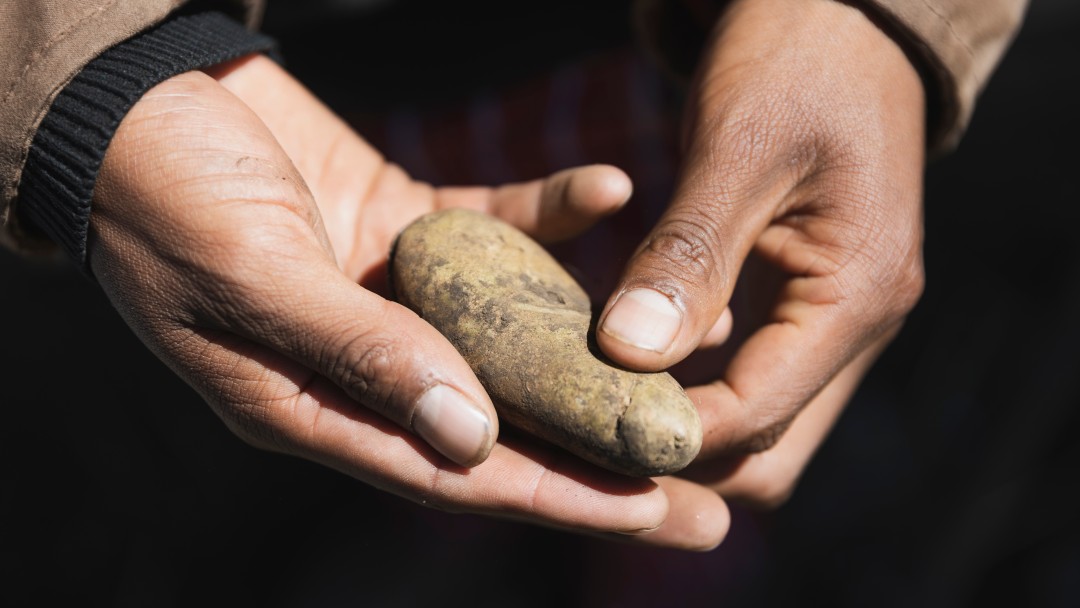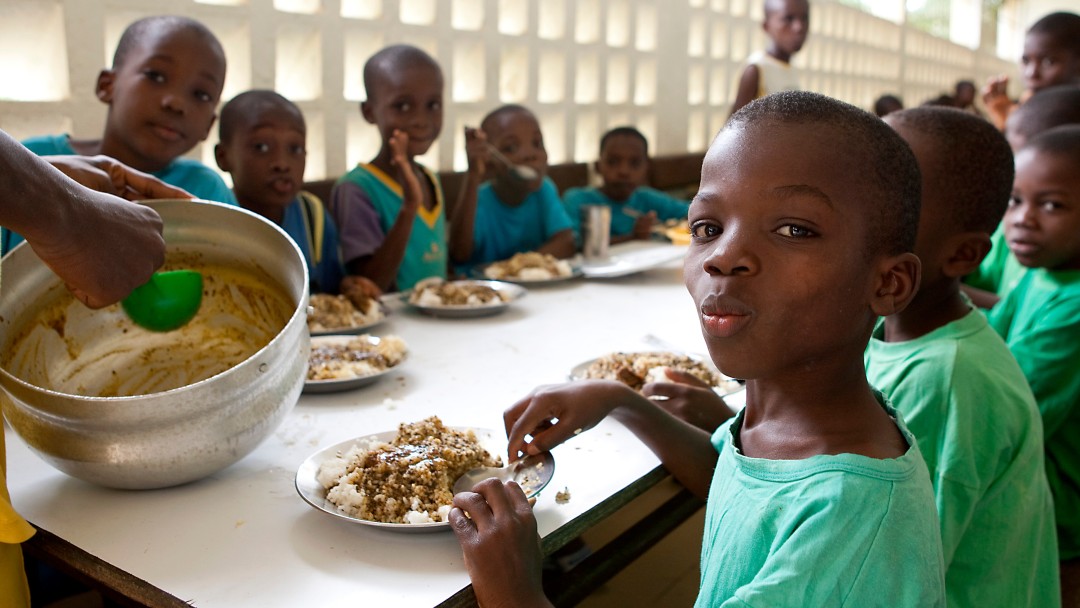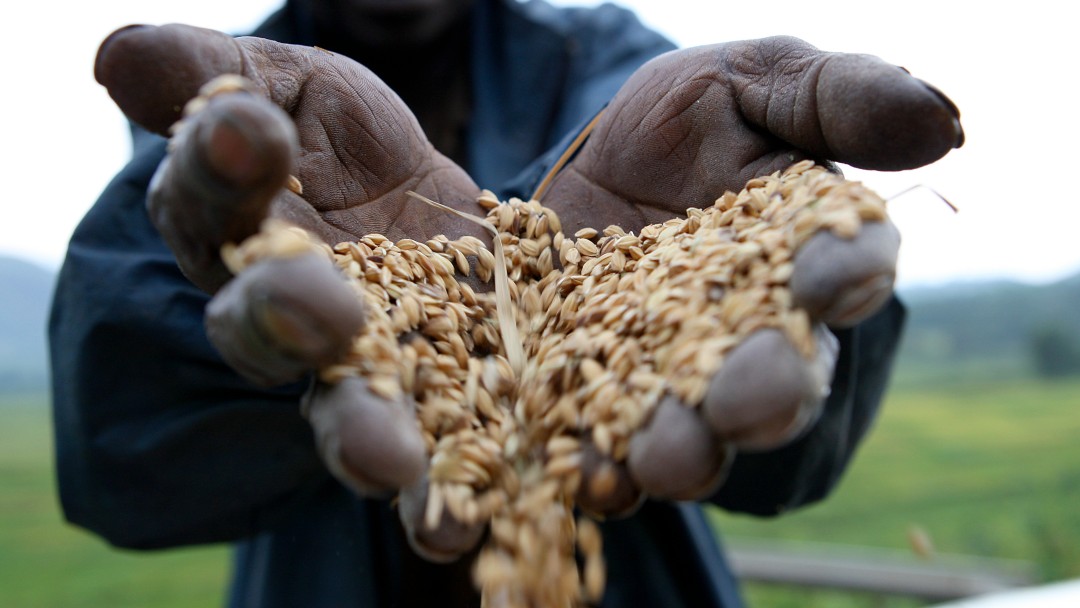News from 2022-10-18 / KfW Development Bank
The hunger crisis becomes a disaster
Welthungerhilfe, Concern Worldwide and KfW present the World Hunger Index: Alarming development.

Climate change, COVID-19 and the rising number of conflicts are leading to an alarming number of hungry people worldwide. Prices for food have risen sharply, especially due to the war in Ukraine. The importance of local food systems in combating hunger was the focus of the online conference at which KfW, together with Welthungerhilfe and Concern Worldwide, presented the new edition of the World Hunger Index (WHI) report on 13 October.
"In Kenya, mothers cook stones to give their children hope that they will prepare food," said keynote speaker Elizabeth Kimani-Murage from the African Population and Health Research Centre (APHRC) in Nairobi, introducing the presentation of the WHI 2022. The Corona pandemic has caused hardship for many families, not only in Kenya. Mathias Mogge, Secretary General of Welthungerhilfe (WHH), welcomed the more than 600 guests who had tuned in online to hear the results of the already 17th World Hunger Index. The report shows that hunger and malnutrition are particularly widespread in South Asia and Sub-Saharan Africa. While in South Asia particularly many people suffer from hunger in absolute numbers and the nutritional situation of children is especially critical, in Sub-Saharan Africa the proportion of hungry people and the child mortality rate are very high.
The situation is bad and getting worse: 828 million people did not have enough to eat in 2021, according to WHI data. The progress made so far in the fight against hunger is being lost, as the proportion of people suffering from hunger is just under 10%, the same level as in 2009. Yet the figures are already outdated when the report is presented, as the war in Ukraine will cause food prices to rise even further in 2022.

Fairer food systems
"The crisis is turning into a disaster," warned Connell Foley. Concern Worldwide's Director of Strategy, Advocacy and Learning summarised the findings of the year's report. In five countries, Central African Republic (CAR), Chad, D.R. Congo, Madagascar and Yemen, the situation is "very serious" and in another four countries, Burundi, Somalia, South Sudan and Syria, the situation is also classified as "very serious", although there is insufficient data available. The outlook is worrying: if the trend does not change, the global community will not achieve its goal of zero hunger by 2030 (Sustainable Development Goal 2). 46 countries will not even reach low hunger levels by then.
"We have to do something now to cushion the problems," warned Barbara Schnell, Head of Sector Policy at KfW. "However, long-term perspectives are needed to make the entire food system fairer as well as more sustainable and to realise the right to food for everyone." As a short-term response, KfW is supporting partner countries in particular, where the effects of the war in Ukraine are particularly severe, with almost EUR 120 million through the special initiative One World Without Hunger. Cash transfers (cash payments) are an important means here to enable access to food despite increased food prices.
Vegetable gardens for food supply
In her opening statement, Elizabeth Kimani-Murage, after the shocking account of the plight of mothers in Kenya, had revealed that local food systems in her country had been disrupted during the pandemic. The delivery of food from the countryside to the cities was disrupted. This is compounded by the most severe drought in the last 40 years, which has lasted for three years in Kenya. The senior researcher at the APHRC stressed that her government has now enshrined the right to food in the Kenyan constitution and is providing aid. But this is not enough: "Citizens must also realise that they have a right to food and demand it." In view of the difficult situation, more investments are needed, Kimani-Murage demanded. But she also reported on initiatives that give cause for hope. Planting a vegetable garden, for example, could decide whether mothers had to cook stones or could put vegetables on the table. Young people in urban poor neighbourhoods are now involved in producing food locally, she said. "The changes at the local level are the most important," said the Kenyan scientist.

Commitment at local level
"People have realised that something has to be done about hunger," Danielle Resnick noted in the following discussion round moderated by Deutsche Welle journalist Christine Mhundwa. The political scientist from the Brookings Institution and International Food Policy Research Institute, a think tank in Washington, reminded the audience that the global food situation will be a topic at both the G20 summit and the upcoming COP 27 world climate conference in Egypt. But international efforts could not replace initiatives at the local level to achieve progress on the ground.
In Pakistan, floods have set back food security efforts. Aisha Jamshed, Pakistan country director for Welthungerhilfe, reported that farmers could not return to their fields even after three months because the flood waters had not yet receded. This means that this year's harvest and next year's harvest will be lost. But in villages where community councils had been established in cooperation with WHH, the losses due to the floods were less because people were informed and better prepared.
Nutrition is not a privilege
Rawda Seman, Concern Worldwide's programme director in Ethiopia, said her organisation had to interrupt long-term projects in favour of short-term aid. To make this possible, she said, humanitarian funding also needs to be more flexible. She also pointed to approaches to ensure food security in communities by distributing seeds of local drought-resistant vegetables and teaching people to grow their own seeds.
Tendai Saidi of the Civil Society Agriculture Network (CISANET) in Malawi pointed to the sharp rise in prices for fuel, fertiliser and transport. In some regions of her country, the price of staple foods such as maize has tripled. Although Malawi allocates 10% of the household budget to food security, this is not enough. She described the cash transfer project for particularly poor people, which is also financed by KfW, as successful, but it must be complemented by education. The trend of buying more and more processed food instead of eating vegetables and fruit is worrying, she said. "Food is not a privilege," Saidi concluded, "citizens must hold their governments accountable to demand the right to food."

Share page
To share the content of this page with your network, click on one of the icons below.
Note on data protection: When you share content, your personal data is transferred to the selected network.
Data protection
Alternatively, you can also copy the short link: https://www.kfw-entwicklungsbank.de/s/enzBWrMC.CyeA
Copy link Link copied